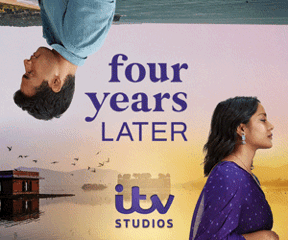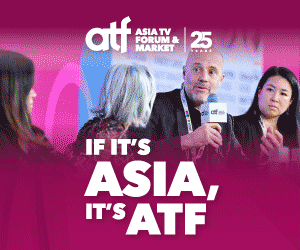
Three versions and multiple seasons of Scandi noir crime drama, The Bridge, have been made around the world. The fourth – and the first in Asia – is a Double Vision production in Malaysia for streaming platform Viu. The Malaysian studio’s head of production, Min Lim, talks about adapting the 10-part thriller, turning up the dial on premium originals and navigating political and cultural sensitivies between Singapore/Malaysia.
The Malaysia/Singapore version of crime thriller, The Bridge, premiered across Asia at the end of November, bringing to a close more than two years of development and opening new routes to production/co-production/funding and distribution.
The 10-part hour-long Viu Original series, based on the Scandinavian noir drama from the Endemol Shine Group scripted format catalogue, premiered simultaneously on PCCW Media’s Asian streaming platform Viu, on traditional regional pay-TV channel HBO Asia across 17 markets (excluding Malaysia) with windows on HBO Go and on HBO On Demand, and on Malaysia’s free-TV channel Media Prima ntv7.
The Asian version pretty much sticks to the international plot, opening with a body found exactly halfway between Singapore and Malaysia on the bridge that links the two countries. The body is split in half, made up of two different women, setting off a hunt for a killer that involves teams from both countries. Throughout the investigation, the killer reveals that he willbring to light five issues that are causing rot on both sides of the border.
The series, directed by Lee Thean-jeen and Jason Chong, stars Malaysia’s Bront Palarae as Malaysian detective Megat Jamil and Singapore’sRebecca Lim as Serena Teo.
Double Vision’s Kuala Lumpur-based head of production, Min Lim, whopushed the project uphill for two years or more, is anything but battleweary, and it sounds like she would, if she could, do it all over again.
How did you deal with the potentially explosive political and cultural dif- ferences between Singapore and Malaysia? “We actually had a lot of fun with it. Obviously you know we have this friendly rivalry with Singapore... not only did we contrast the two countries but we also had the two leads who are different races – one Malay [Bront Palarae] and one Chinese [Rebecca Lim]. So you also have not just the d...
Three versions and multiple seasons of Scandi noir crime drama, The Bridge, have been made around the world. The fourth – and the first in Asia – is a Double Vision production in Malaysia for streaming platform Viu. The Malaysian studio’s head of production, Min Lim, talks about adapting the 10-part thriller, turning up the dial on premium originals and navigating political and cultural sensitivies between Singapore/Malaysia.
The Malaysia/Singapore version of crime thriller, The Bridge, premiered across Asia at the end of November, bringing to a close more than two years of development and opening new routes to production/co-production/funding and distribution.
The 10-part hour-long Viu Original series, based on the Scandinavian noir drama from the Endemol Shine Group scripted format catalogue, premiered simultaneously on PCCW Media’s Asian streaming platform Viu, on traditional regional pay-TV channel HBO Asia across 17 markets (excluding Malaysia) with windows on HBO Go and on HBO On Demand, and on Malaysia’s free-TV channel Media Prima ntv7.
The Asian version pretty much sticks to the international plot, opening with a body found exactly halfway between Singapore and Malaysia on the bridge that links the two countries. The body is split in half, made up of two different women, setting off a hunt for a killer that involves teams from both countries. Throughout the investigation, the killer reveals that he willbring to light five issues that are causing rot on both sides of the border.
The series, directed by Lee Thean-jeen and Jason Chong, stars Malaysia’s Bront Palarae as Malaysian detective Megat Jamil and Singapore’sRebecca Lim as Serena Teo.
Double Vision’s Kuala Lumpur-based head of production, Min Lim, whopushed the project uphill for two years or more, is anything but battleweary, and it sounds like she would, if she could, do it all over again.
How did you deal with the potentially explosive political and cultural dif- ferences between Singapore and Malaysia? “We actually had a lot of fun with it. Obviously you know we have this friendly rivalry with Singapore... not only did we contrast the two countries but we also had the two leads who are different races – one Malay [Bront Palarae] and one Chinese [Rebecca Lim]. So you also have not just the difference in national culture, but also the differences in races. We wanted Megat and Serenabe very typical of the countries that they came from and embody the different characteristics...So basically, she’s the anal one from Singapore and he’s the laid back one from Malaysia.”
For example... “She is high IQ/low EQ, efficient, by the book. He has a different way. He’s very charming. People like him and you see that in the first scene when he arrives in Singapore. He does what a lot of Malaysians do. He brings them food and immediately the Singaporeans are like ‘wow, you know, I take back every bad thing I’ve said about Malaysia ICD’. So he has a very personable manner and that’s what makes the contrast so interesting. It is not just the differences in culture but also the differences in character. When these two meet, they actually start off on a bad foot. They don’t like each other, they just rub each other up the wrong way. But over the course of the series they form this bond. And that’s really the arc of their story.”
You spent about two years developing the Singapore/Malaysia version...“We started talking about it two years ago and we kept saying ‘yes it’s a great story. We should do this’. We have a bridge [between Singapore and Malaysia]. It makes a lot of sense. There’s a lot of relevance and we can make a really really good local adaptation. But it needs to be done at a certain budget. It’s a story that has a lot of characters, a lot of plot lines, a lot of scenes. The budget is high for a reason, but we just couldn’t find a broadcaster who would do it.”
And then Viu stepped up... “I remember talking to Kingsley [Warner, Viu Malaysia’s general manager] about it and he was like ‘this is actually a great story’... And he really made this happen. So this is all verymuch due to him as much as it is for us.”
There are some significant changes to the original script, includ- ing taking out all the sex to comply with Malaysia/Singapore content codes. What did you replace it with? “We didn’t take out all the sex. I think now we imply sex... We knew from day one that this was going to go on free-to-air TV as well as on OTT, where you have a little bit more leeway. But the facts are that the series will air on free to air and that this genre has never really been done before in Malaysia. Not just that it’s crime, butin how the characters are shown.”
For example... “In the original or even the U.S. or the U.K. versions, the Serena character goes to a bar, picks up a bartender, takes him home and has sex with him. Immediately afterwards, she goes back to work and he’s very confused. We felt that just wouldn’t work in an Asian setting... as liberal as we would like to think we are, the audience would have judged her for it. And so we’ve changed that slightly and still kept a bit of it but kind of gave her a bit of legitimacy with a work relationship... we kept elements but found a way to do it that worked in a local setting.”
The international versions have a diverse cast in terms of looks and physical abilities not often seen in Asian drama... “We wanted a variety of looks. When you look at Asian drama, the look and the styling tend to be the same. Or the girls are very pretty, dressed very well, especially idol drama, Korean and Taiwanese... we were very conscious of getting people who looked like real people... Malaysia and Singapore have diverse populations – Chinese, Malay, Indian, Eurasian... we’ve managed to get the whole gamut. So that’s kind of what we were concerned about in terms of diversity.”
What lines did you draw between cultural stereotypes that were relevant and cliches? “We didn’t avoid the cultural stereotypes... because that’s what the audience identifies with. We could have gone down a route where we maybe flipped them or did different things. But now that they are culturally stereotyped, it’s almost easier for the audience to identify and go along on this journey.”
So the stereotypes are deliberate? “Yes. Because the journey is quite complex and varied and the story is very dark... There’s a lot happening that makes it incredibly different from a lot of local drama. It’s not just a family story, there are different things you have to follow. So, we thought that giving audiences a character or characters that they could identify with and go on this journey with was a lot better.”
Is there a season two? “Not yet”.
Published in Issue Seven of ContentAsia's in-print + online 2018 (December 2018)



















